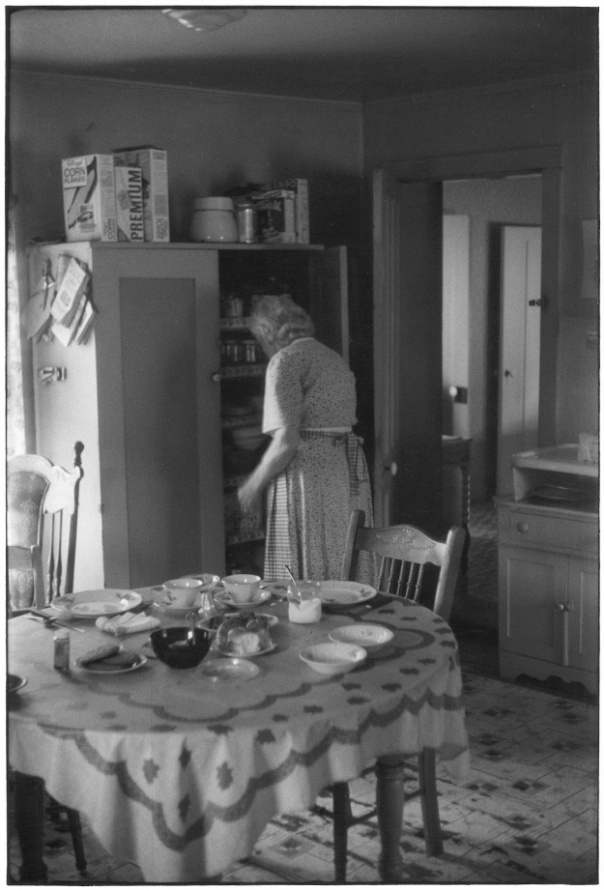In the hours after attending an event sponsored by the University of Kentucky Libraries Special Collections Research Center, “From Plows to Plates: A Journey Through Kentucky Foodways,” I did a lot of pondering. Not just about the local food movement and what we, in Kentucky, eat and why. These things are, of course, of interest to me professionally. I work in retail marketing and promote food for a living. But I also pondered the women speaking on the panel. How each seemed to have an overwhelming and innate need to feed others. Both literally and figuratively-through their teaching. This inclusion of women at the table, as it were, as farmer and chef and businesswoman, struck me as an inspiring shift from the men who’ve run the conversation about food, from plow to plate, for so long. An important re-framing of the conversation in my eyes, and perhaps an obvious one. And finally, I pondered Chef Ouita Michel’s words when she noted, “Restaurants are not Food Culture.” A strong assertion from someone who has built her career in that particular world. But it’s true. Food Culture HAS to be more than a burgeoning row of restaurants in Downtown, U.S.A. It HAS to be more if we plan on creating and maintaining sustainable agricultural landscapes and foodways. If we plan on cleaning up our act both in terms of lifestyle and environmentally.
So, if casual family dining is NOT Food Culture, I decided to reflect on what, for me, it IS…
It’s teaching your children how to crack eggs and roll out dough as they stand, tip-toe, on a step-stool.
It’s putting seeds in the ground and having faith that they will grow.
It’s hefting a bag, busting at the seams with ingredients, over your shoulder and wandering home, cooking the next week’s meals in your head the whole way.
It’s Farmer’s Market Saturdays and biting into a piece of fruit so juicy you idiotically attempt to lick your elbow.
It’s sitting down to share a table with the man you will marry, the grandmother you will someday lose, the unsung hero of your day-to-day.
It’s the parent who wonders how they’ll feed the family this month, the sacrifices they make to do so.
It’s the meals that got you through the day you got the job, the day you moved away, the day your heart was broken.
It’s the familiar handwriting in the long forgotten cookbook.
It’s chickens in your backyard and herbs on your windowsill.
It’s the struggle of the first year farmer.
It’s spaghetti once a week and oatmeal every morning because you spent your paycheck on textbooks and dreams.
It’s the kid at the grocery store who your sons know by name, arguing over who gets first fist-bump.
It’s the casserole dish dropped off for bleary-eyed parents and black-clad mourners.
It’s the baker who, chocolate and flour covered at days end, sings “Happy Birthday” while putting the finishing touches on each cake, hoping you can taste her well-intentioned off-key notes in that coveted corner piece.
It’s the line cook from a small town in the mountain’s no one’s heard of who speaks perfect Spanish.
It’s the farmer’s son, who everyone said “grew like a bean pole” and was the “spitting image of his daddy,” bringing in the harvest on his own.
It’s the chefs who come home to cook the meals they spent a lifetime trying to stop tasting, turns out their palate never was quite cleansed.
It’s eating what makes YOU feel good.
It’s policies that help put an end to food deserts and monoculture agriculture.
It’s a Wendell Berry poem.
It’s history and past and nostalgia — every food you ever ate that’s tied to a memory you love.
It’s knowing that eating is one of our most basic needs as humans. How things are grown and cooked, the community that comes from breaking bread with others, THAT is all just a beautiful extra.
Now I’d love to turn the tables and find out – What does Food Culture mean in the context of YOUR life? If you’d like to read more about the local food movement and sustainable foodways–Barbara Kingsolver, Michael Pollan, and Wendell Berry are great places to start.
(Photo: Grandmother by kitchen cabinet; table with dishes in foreground.)

4 thoughts on “Restaurants are not Food Culture.”